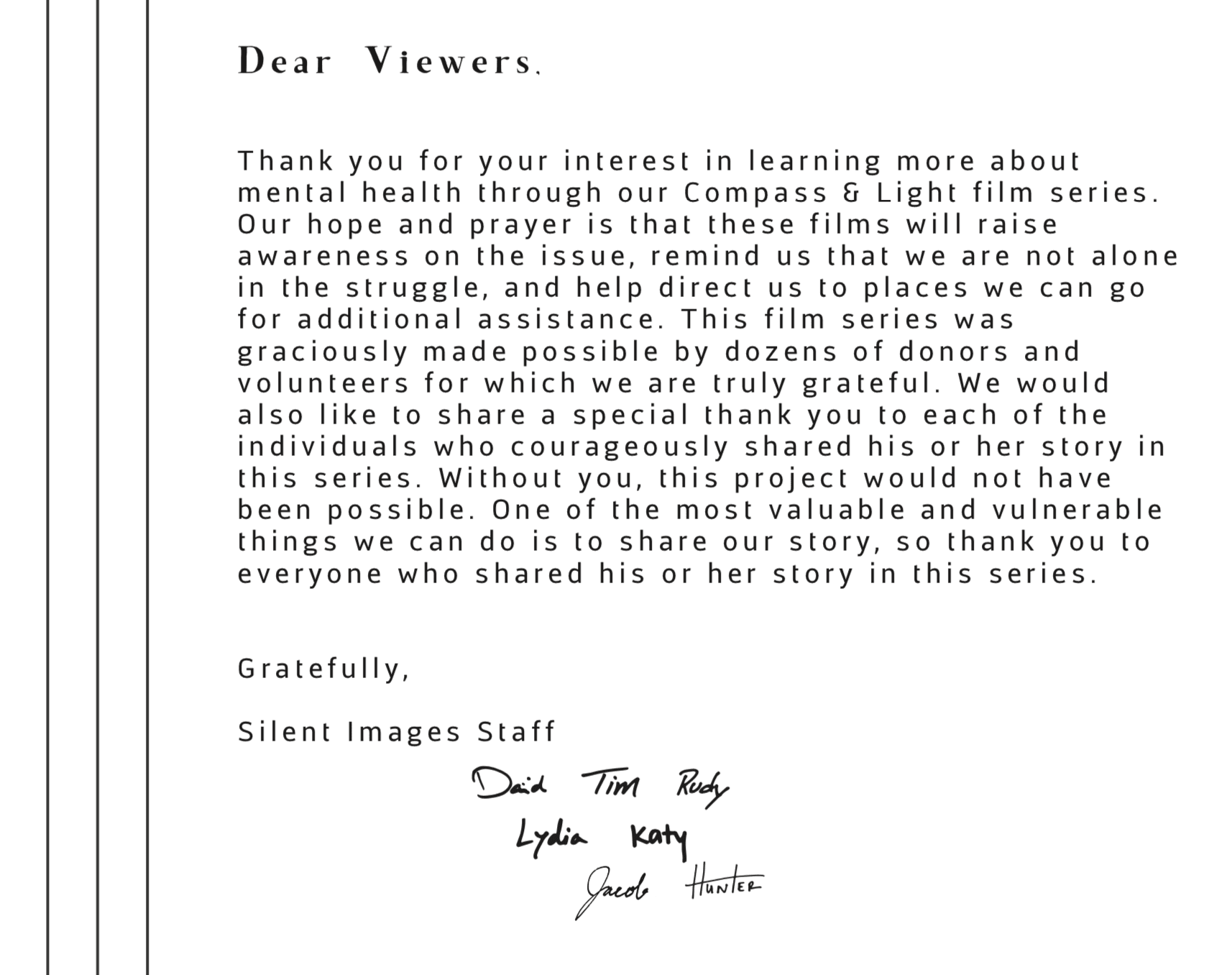Please watch the below videos on
Depression & Addiction:
Journal Questions for Depression:

1. What are some of the common misconceptions of depression? After viewing the film, how would you now define depression?
2. Fonda mentions that some days she has to “put on a mask”. How do you relate to this feeling?
3. Guillermo says depression looks different for everyone. What differences can you see between Fonda, Guillermo and Josh’s stories? Since depression symptoms can be so varried from person to person, what challenges can that create for our community?
4. How do you see the role of trauma played out in this video?
5. What was most impactful to you about Josh’s story? The rate of attempted suicides in adolescents continues to rise, so what can we do to better support the youth in our community?
6. Dr. Feather mentions that 1 in 5 people suffer from a mental health problem. How should this fact change how we view our business or church community? Do we offer enough resources for the possibly large number of people who are suffering?
7. Was it surprising to hear the connection of family history and mental health? What are some actions you will now take to consider your family history as it relates to mental health?
8. Josh says that we’ve created a culture that makes it hard for people to admit they are hurting and need help. Do you agree with him? Why or why not?
9. Guillermo says that we need to switch our thinking around seeking help for mental health. If you had to go to counseling or be on medication for a mental health issue, how would you feel about that? How do you think other people in your life would react?
10. Dr. Feather, Guillermo and Josh talk about the unique stigma around mental health? Why do you think this exists? Why do we treat it differently than a physical illness or injury?
11. As an individual, what do you think it takes to be a safe place for someone who is suffering with depression?
12. Make a list of encouraging things you could say or do as you walk with a friend who is suffering with depression.
13. Take some time and discuss the Bible verses below and how they relate to a Christian perspective on depression.
14. Take some time and pray for your own mental health and for the health of those around us.
Scripture Reading:
- Romans 3:5
- Matthew 27:46
- Lamentations 3
- Psalm 13
- Psalm 34:18
- 1 Peter 4:16
Journal Questions for Addiction:

1. What is the difference between substance addiction and a process addiction?
2. Brian’s journey toward addiction was complicated, and was not just a one-time incident that drove him toward a life trapped by his substance addiction. List a few of the life circumstances that led him toward addiction.
3. Meredith says, “I missed all of the signs.” What does this tell us if even a spouse can miss the signs of addiction?
4. Monica mentions, “Addiction is a way of coping with life when one does not know how to do so relationally.” Since this is often learned at a young age, what are the things we can do to encourage healthy coping skills?
5. Monica says that addiction often gets worse with time. What should we do to proactivly catch addictive behavior earlier? School counselors are often overwhelmed, so what are some practical solutions to catch addiction sooner?
6. Heidi’s journey toward addiction was triggered by sev- eral traumatic situations in her childhood. What do you think would have made a difference in her life to help her better process this trauma?
7. Monica says, “Addiction only needs secrecy and shame to build. This is how it grows.” What is the greatest weapon against secrecy and shame?
8. What can churches and schools do to facilitate a safer and more welcoming environment for people to share their struggles of addiction?
9. Why is there such a stigma with sexual addiction? Why are we more likely to give a platform to a former drug addict than we are a sex addict?
10. Monica mentions that there is healthy shame and toxic shame. In your own words, can you explain the dif- ference?
11. Monica says, “Joy connections propagate faster than addiction, and we have more power than the drug deal- ers.” Do you agree with this? Can a church or school propagate these moments, or is this done more within a family and in someone’s personal journey?
12. Adam mentions that addiction is the result of undealt grief. Take a few minutes and privately think through and possibly list out the most tragic moments of your life. Did you properly deal with these? How do you remember initially handling your feelings of pain? Do you still need to process and work through any of these moments? If
so, write out a list of practical action steps you think you should take to move closer toward healing
13. Dr. Roberts mentions that “trauma is what’s driving the addiction.” Why do you think this is?
14. Dr. Roberts did a study and found that more than 50% of pastors and women struggle with some form of sexual addiction. Does this surprise you? How do you think shame plays into this?
15. Adam mentions that today “kids are first introduced to pornography as early as eight years old”. What actions can parents take to protect their families from the dangers of a media-saturated society?
16. When you think through your life right now, what degree of ownership do you have in your story, what parts of your story are you afraid of or unwilling to share? How could this be affecting your life? List two people with whom you are willing to share you story.
Scripture Reading:
- Hebrews 4:15-16
- 1 Corinthians 10:13-14
- James 5:15-16
- Psalm 50:15
- Psalm 30:1-3
- 1 Thessalonians 5:14


